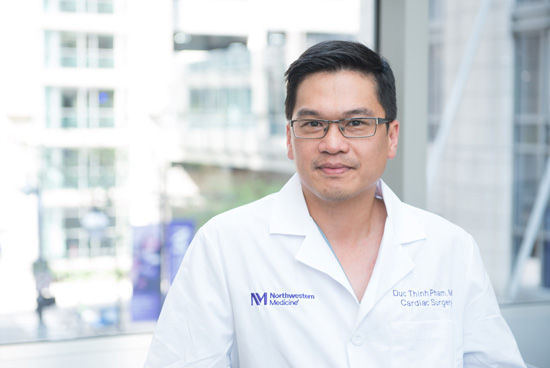Surgeon Spotlight: Dr. Duc Thinh Pham
As a cardiac surgeon with a focus on heart valve disease, Duc Thinh Pham, MD, relishes the collaborative style of his team at Northwestern Memorial Hospital. This affords him the opportunity to care for a wide variety of patients.
"We have some of the world’s leading experts on a vast spectrum of diseases and procedures, which means we are able to work together to create optimal protocols for patients with very complex illnesses,” says Pham. "I really enjoy working with my colleagues in cardiac surgery and interventional cardiology on both open, minimally invasive heart surgeries and transcatheter valve interventions. This collaboration allows us to offer a breadth of innovative and individualized therapies for our patients.”

Clinical Excellence at Northwestern Memorial Hospital
Pham is the surgical director for both the Center of Heart Failure and the Heart Transplantation/Mechanical Circulatory Support Program at Northwestern Memorial Hospital. He is an associate professor at Northwestern University Feinberg School of Medicine and is no stranger to Northwestern in general.
After graduating from his general surgery residency at the University of North Carolina School of Medicine, Pham completed his cardiothoracic surgery training and an advanced fellowship in heart failure and valvular surgery in the Cardiovascular Surgery Program at Northwestern University Feinberg School of Medicine.
He moved to Boston in 2006 to lead the Heart Transplant Program at Tufts Medical Center but returned to Chicago in 2015 to take on a new clinical role at Northwestern Memorial Hospital. His clinical specialties involve all aspects of adult cardiac surgery, including complex and high-risk mitral valve surgery, aortic valve repair and replacement including aortic root surgery and tricuspid valve surgery. He has performed nearly 4,000 cardiac surgeries, of which over 1,000 involved heart valve procedures.
“Because untreated or poorly treated valve disease can quickly lead to heart failure; it’s essential to explore treatment methods that stop the disease process in its earliest stages,” says Pham. “At Northwestern Memorial Hospital, we focus on cutting-edge technologies and research because we want to provide our patients with the best care possible. Our patients’ wellbeing and that of their families is foremost in our mind. No matter what, we’re here to help patients achieve wellness and to live full lives.”
Passion for Health and Wellness
As a child, Pham and his family moved to North America after the Vietnam War. He says his family has always held wellness in high regard: “We survived the war, and that experience changed me forever. I realized that beyond survival, one of the most basic human needs is medicine for health and wellness. Pursuing medicine and helping people achieve good health and wellness is an area in which I feel I help others the most,” he explains.
During his time as a medical student and surgical resident, Pham was exposed to many pathologies and organ systems. But the heart captivated his attention.
"I consulted on a case of a woman who came in with triple valve endocarditis. She was nearly dying; we rushed her to surgery that evening, and the following day, she was sitting up in a chair, talking to her family again,” Pham recalls. “That case impressed upon me what an immediate impact we as cardiac surgeons can have on a patient’s life—and quality of life.”

A Focus on Family
Pham says his passion for cardiac care is driven by this desire to help patients enjoy time with their families and friends and to live their most happy, productive lives.
"When I’m not doing what I do for a living, I’m pursuing activities that I want my patients to be able to enjoy, things like relaxing and spending time with family and friends, attending sporting events, and exploring the city,” he says.
Pham’s wife is an architect; they’ve known each other for over 30 years. They have three children. The family is passionate about enjoying all the Chicago has to offer.
"For me, it’s all about family,” says Pham, “and helping people get the most out of life.”
